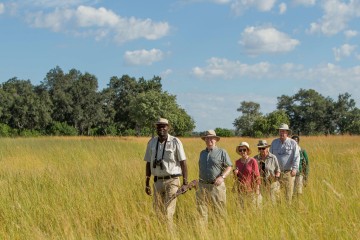
Ultimate Botswana Flying Safari
Indulge in the ultimate Botswana flying safari, exploring Le Roo La Tau, Moremi, Okavango Delta, Savute & Chobe for a truly unforgettable adventure.
One of Africa’s most distinctive safari destinations – and one of the world’s most extraordinary wilderness areas – the Okavango Delta is an unmissable highlight on any tour of southern Africa. Botswana’s UNESCO-listed delta is a biodiversity hotspot inhabited by countless species of unique wildlife and a select few indigenous tribes who've managed to carve out a living here by coexisting with their immensely wild environment.
One of our planet's last true unspoiled corners and a destination that's seen minimal tourist footprint, the Okavango Delta is unlike any other place you will ever visit. Here, you can disconnect from the outside world, be immersed in pristine nature and be surrounded by an insane number of iconic African animals.
Ever wanted to live your very own National Geographic African documentary? The Okavango is where that dream flourishes.
Here are a few essential tips and interesting things to know before planning your visit.
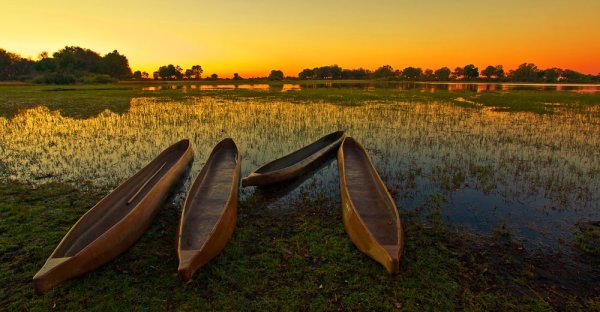
On such flat, nature-infused terrain, the sunrises are breathtaking.
What animals are you more likely to see in the Okavango Delta, and when?
Want to visit the Okavango on a budget? You can do that too!
The Okavango Delta is located in northern Botswana, in Africa’s southern region. It’s nestled within the Kalahari Basin and covers a colossal area of about 15,000 square kilometers. The delta is formed by the Okavango River, which originates in Angola and flows into Botswana. What sets it apart and makes it unique is that instead of flowing into the sea – like deltas traditionally do – the Okavango discharges its water into the famous Kalahari Desert, creating an insanely vast and luscious wetland oasis amid a brutally arid environment. Just outside its boundaries, the land is parched and beige. Crossing into the verdant delta is an unreal experience.
This unusual inland delta is a remarkable natural wonder, known for its labyrinth of channels and lush islands that nurture an extraordinary array of wildlife species. A visit typically includes ample time to simply soak up the magical quietude of this natural haven, dotted with outings – by foot and canoe – to catch glimpses of elephants, lions, zebras, cheetahs, buffalo, hippos, leopards, hyenas and crocodiles, alongside thousands of endemic plant species and hundreds of birds.
As the world's largest inland delta, the Okavango is widely considered Botswana's crown jewel. As a safari destination in Africa, it has virtually no rivals. Nowhere on the whole continent can you immerse yourself in this kind of unspoiled and remote wilderness and see so many animals in their natural habitat, unbound by fences. With its spectacular landscapes and dramatic seasonal changes, the Okavango is that one safari destination you could visit over and over again. Every time, a little more of its magic is revealed.
A visit to the Okavango takes time and patience. The rewards? Indescribable. When you cast off for a remote and isolated luxury camp or lodge, it's as if you are entering an entirely different realm. All safari destinations in Africa are exceptional. But there's something about the Okavango that makes it a little more so.
When talking about once-in-a-lifetime African safari experiences, you'd be hard-pressed to find a more enticing spot.
The main gateway to Okavango Delta is the town of Maun, easily reached by a short flight from Johannesburg. There are also direct connections from Cape Town and Kasane, which is only 90km west of Victoria Falls and easily reached by car.
From Maun, your transfer options depend on your chosen accommodation and how much time you've got up your sleeve. You can take a chartered flight or road transfer to your luxury lodge or camp.
BY ROAD AND/OR BOAT – Depending on the time of year you visit, road transfers may also include travel by traditional mokoro, a type of dugout canoe that is typically the main transport form within the delta.
BY SMALL PLANE – Some of the delta’s most remote lodges and camps are only reachable by charter flight. If you stay in the right camp, at the right time of year, you can still enjoy excursions by mokoro so make sure to ask us about this option if it’s something you’d love to experience. Charter flights offer jaw-dropping views of the delta from above, so it's as much about enjoying a spectacular scenic flight as it is utilizing a convenient mode of transport. Most flights take around 30-45 minutes and are sensational highlights in their own right.
Once settled in, your days will be filled with excursions to discover the delta's unique wilderness and wildlife.
All lodges and camps organize daily excursions. However, how these excursions are taken – on foot, by 4WD jeep, or mokoro – depends on the specific type of camp. Wet camps, as they are known, primarily focus on water-based activities (outings are by mokoros and/or motorized boats) as well as walking safaris. Dry camps, on the other hand, offer game drives on 4WDs instead. Some camps boast relatively high-water levels all year, while others are susceptible to greater water level fluctuations.
For a truly comprehensive Okavango Delta experience, we recommend you combine both types of camp stays into the one, all-encompassing itinerary.
To be honest, our guides report having to pry clients away from their camp at the end of their visit – no matter how many days they stay! That’s just the kind of addictive pull the Okavango boasts. Typically, however, a 2–3-night stay at each camp is ample time to immerse yourself in the dramatic wilderness and heighten your chances of seeing a variety of wildlife. Ultimately, though, it depends on your time availability and interests.
The ideal number of days to spend in the Okavango also depends on the time of year you visit – which we cover below. Wildlife tends to concentrate on permanent, year-round watering holes in the dry season, so you're likely to see more animals daily and could do with a shorter visit. In the wet season, however, the delta swells to almost twice its size, wildlife travels extensively, and it's harder to see a more significant concentration of species, so more days are preferable.
As mentioned above, the delta experiences dramatic seasonal water level changes, which can vary from year to year. In some years, the delta can double in size – in others, it swells by just a few kilometres in certain areas. It’s important to note that the delta does not flood (or dry) in an equal manner, all over. That’s why some camps offer year-round water-based activities.
Given the fact that rainfall must travel over 500km to reach the delta from Angola, high-water levels actually occur right in the middle of the dry season – which runs from May to October. Generally, the best recommended time to visit the Okavango Delta is between July and October, although given the array of camp location choice (both wet and dry) and activities, it is widely considered a year-round destination.
No matter what time of year you visit, the Okavango Delta is a safari win-win in our books.
Since the reintroduction of rhinos, the Okavango Delta is now home to the Big Five, as well as over 500 species of mammals and untold species of aquatic wildlife and birds. The most common wildlife species to spot here all year round are elephants and giraffes (because in such flat terrain, you can’t miss either one!), as well as wild dogs, crocodiles, hippos, zebra, hyenas, lions, cheetahs and leopards.
Bird lovers will have the field trip of a lifetime on a visit to the Okavango Delta – from colourful bee-eaters and herons to fish eagles and the rare Pel's fishing owl. All up, the delta is home to over 400 bird species. Birdwatching is rewarding throughout the year, but the wet season attracts migratory birds, adding to the incredible variety.
The Okavango Delta is home to several indigenous groups, including the San (also known as Bushmen) and the Bayei people. These indigenous tribes have historically lived in harmony with the Okavango Delta, relying on its resources for sustenance and cultural practices.
The San people are one of Africa’s oldest indigenous groups and boast a fascinating and rich cultural heritage. They have traditionally lived as hunter-gatherers, relying on the delta’s natural resources to survive and develop a deep connection with the unique ecosystem.
The Bayei people, on the other hand, are more recent inhabitants of the delta, known for their expertise in navigating its intricate network of channels using traditional mokoros (dugout canoes).
Indigenous groups living in the delta face an array of modern challenges. Yet, efforts are being made to involve communities in conservation and eco-tourism initiatives that respect their rights while preserving their cultural heritage. Visiting a traditional village on a visit to the Okavango Delta is an enriching experience.
>
Want luxury in the wilderness? You got it!
Luxury camps in the Okavango are prime locations, offering stunning views of the surrounding landscapes and ample chances to spot wildlife from the comfort of your safari chair. They are strategically positioned to maximize privacy and provide an intimate experience immersed in nature. They generally offer spacious and well-appointed tented suites or chalets with comfortable beds, private bathrooms (with hot and cold running water), indoor and outdoor showers, and private decks or verandas. Some camps even have private plunge pools for you to enjoy!
Given its isolation, you'll be impressed by how much comfort and indulgence are offered in the luxury camps and lodges in the Okavango. We're talking gourmet dining, well-stocked bars, wellness treatments, and a host of private, guided excursions.
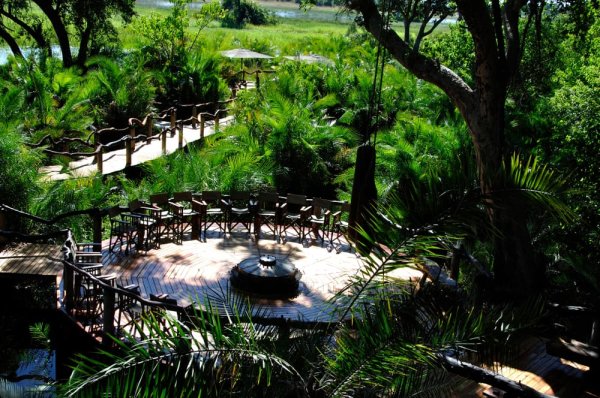
The evening bonfire spot in one of the delta’s luxury camps.
See Viva’s Ultimate Botswana Flying Safari to get a gist of the authentic experience in Botswana, including visits to the Makgadikgadi Pans, Moremi Game Reserve, Chobe National Park, Victoria Falls & the Okavango Delta.
If your budget is limited, you can still visit the Okavango Delta on an adventure-filled small group tour. Simply swap that luxury lodge option for a (still very comfortable!) rustic tented camp stay, and you can still soak up the wonders of this incredible place. Small group tours are fantastic options if you'd love to experience road travel (in converted expedition trucks) in Africa and travel with a great group of like-minded explorers.
See Viva’s Botswana Wildlife Camping Safari Small Group tour to see how easy and affordable it can be to visit the Okavango Delta – alongside Botswana’s best highlights.
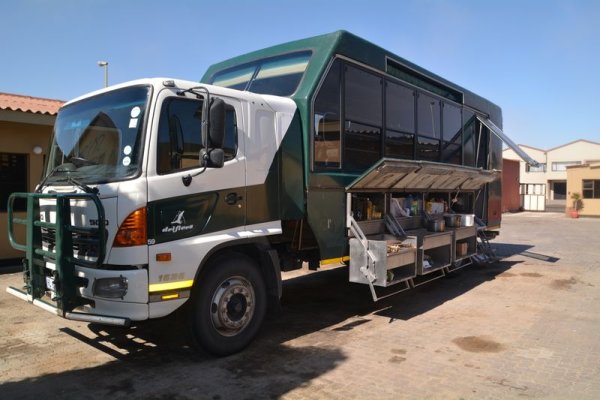
Small group expedition vehicle – a fabulous way to explore Botswana!
The Okavango Delta is one of Africa’s most enchanting destinations, so ensure it finds its place on your travel itinerary for your next safari adventure. Browse our Botswana Tour itinerary ideas and contact Viva’s Destination Specialist – they'll work with you to hone in on the best Okavango Delta experience to match your time, budget and desires.
Laura PattaraLaura Pattara has guided overland trips across Africa and now focuses her writing on the continent for Viva Expeditions. She once camped beneath a marula tree that an elephant tore apart during the night, yet somehow she still sleeps best in a tent. But make it glam! From sunrise balloon rides over the Serengeti to following the rhythms of wildlife migrations, Laura brings the wild heart of Africa to life with warmth, depth, and the occasional muddy boot. |

Indulge in the ultimate Botswana flying safari, exploring Le Roo La Tau, Moremi, Okavango Delta, Savute & Chobe for a truly unforgettable adventure.
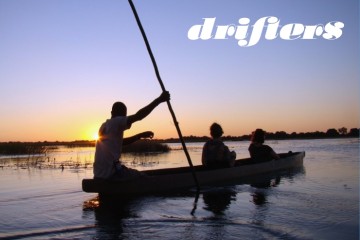
Drifters Tours: Africa Safaris in Southern & East Africa using state-of-the-art vehicles and offering both camping and accommodated small group tours.
Small Group Tours: Embark on an escorted small group tour to discover the stunning continents of South America, Africa, Antarctica and New Zealand. A group tour gives you the opportunity to explore in a fun and exciting environment surrounded by like-minded travellers.
Pioneer Tour: Experience the captivating Okavango Delta in Botswana and explore other wildlife-rich reserves.
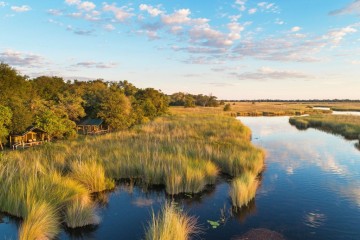
Explore the untamed splendor of Botswana with our 5-night Fly-Around Safari. Explore the highlights of Moremi Game Reserve and Chobe National Park.